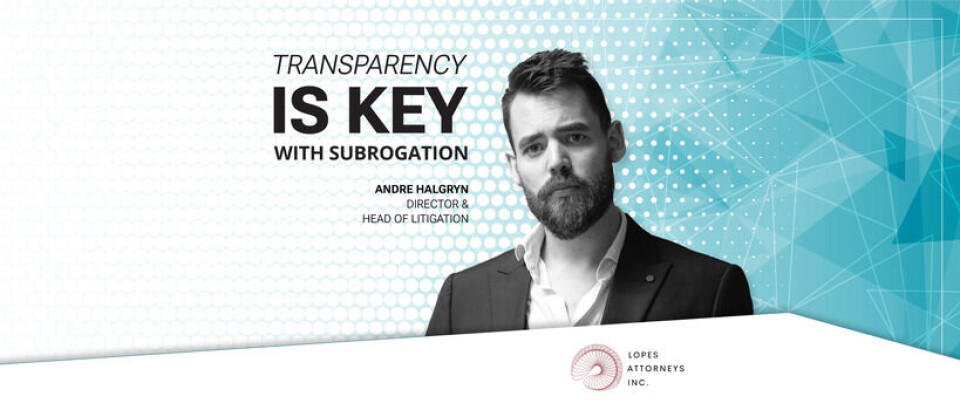Copyright : Re-publication of this article is authorised only in the following circumstances; the writer and Africa Legal are both recognised as the author and the website address www.africa-legal.com and original article link are back linked. Re-publication without both must be preauthorised by contacting editor@africa-legal.com
Transparency is key with subrogation

Many people get a nasty shock because they don’t understand what subrogation in insurance policies involves. André Marius Halgryn unpacks the issues in this interview with Annie Dorasamy.
Did you know that you could be embroiled in a lawsuit and only be notified at the 11th hour, simply because you were not aware of the subrogation clause in your insurance policy?
Subrogation is the fine print built into insurance contracts – often in short term contracts – that allows the insurer, upon paying out a claim to the insured, to recoup the money from a third party who caused the damage to your assets.
This could include claims being made on motor vehicles, medical negligence, household goods, animals or even a valuable comic book collection.
André Marius Halgryn, director and Head of Litigation and Dispute Resolution at Lopes Attorney Inc., says the majority of the insured in South Africa aren’t really aware of this clause.
Referring to the common case of motor vehicle accidents, Halygryn explained that, “Only one out of ten South Africans would know that when you make a claim from your insurance company and you accept that money, you are authorising them to recover the damages that they paid to you from the liable third party. Often this fact is not well communicated to you as the insured party.”
While insurance companies usually appoint their own attorneys to handle the recovery of damages from a third party at no additional cost to the insured, the experience for the insured can be a daunting one.
Halgryn says in worst case scenarios, the insured party only finds out about the potential lawsuit when they are called upon to sign a discovery affidavit or appear in court to be cross examined if the third party disputes being the only negligent party. This sometimes happens up to two years after a claim has been paid out and in the absence of the insured knowing there is any litigation going on in their name.
“My suggestion in this regard is that, from the inception of the insurance policy, adequate attention is drawn to the subrogation or cession clauses,” he said.
“I would be in huge favour of reform, even on a legislative level, where each insurance company, internally takes it upon themselves to effect these decisions on a policy board level to make sure that every South African knows what it is they're getting themselves into. There are certain individuals who may say, ‘I would prefer not to submit a claim if that could result in me needing to testify in court in two years; I would prefer to pay my own damages, or use my own lawyer’,” Halgryn noted. In this instance, the insured person should have the freedom of choice to make their own litigious decisions.
He says subrogation is an important and crucial part of insurance, but understanding what it entails and the options available to the insured is equally as important.
“We talk about all these wonderful principles of protecting people and exercising your rights, but if you have an instance where you have a person who is a layman and they don't know what their rights are, then quite frankly it's the same as if that person did not have any rights,” said Halgryn.
“Transparency is a key value not only of our Constitution, but also of how we run our practice. Each one of our clients knows exactly what's happening in their files. They know all the options that are available to them, and if we could utilise those principles of transparency at each phase of the litigation process, I think we would have a lot more happier South Africans making informed decisions and knowing how the terms of their insurance policies function,” Halgryn concluded.
To join Africa Legal's mailing list please click here
